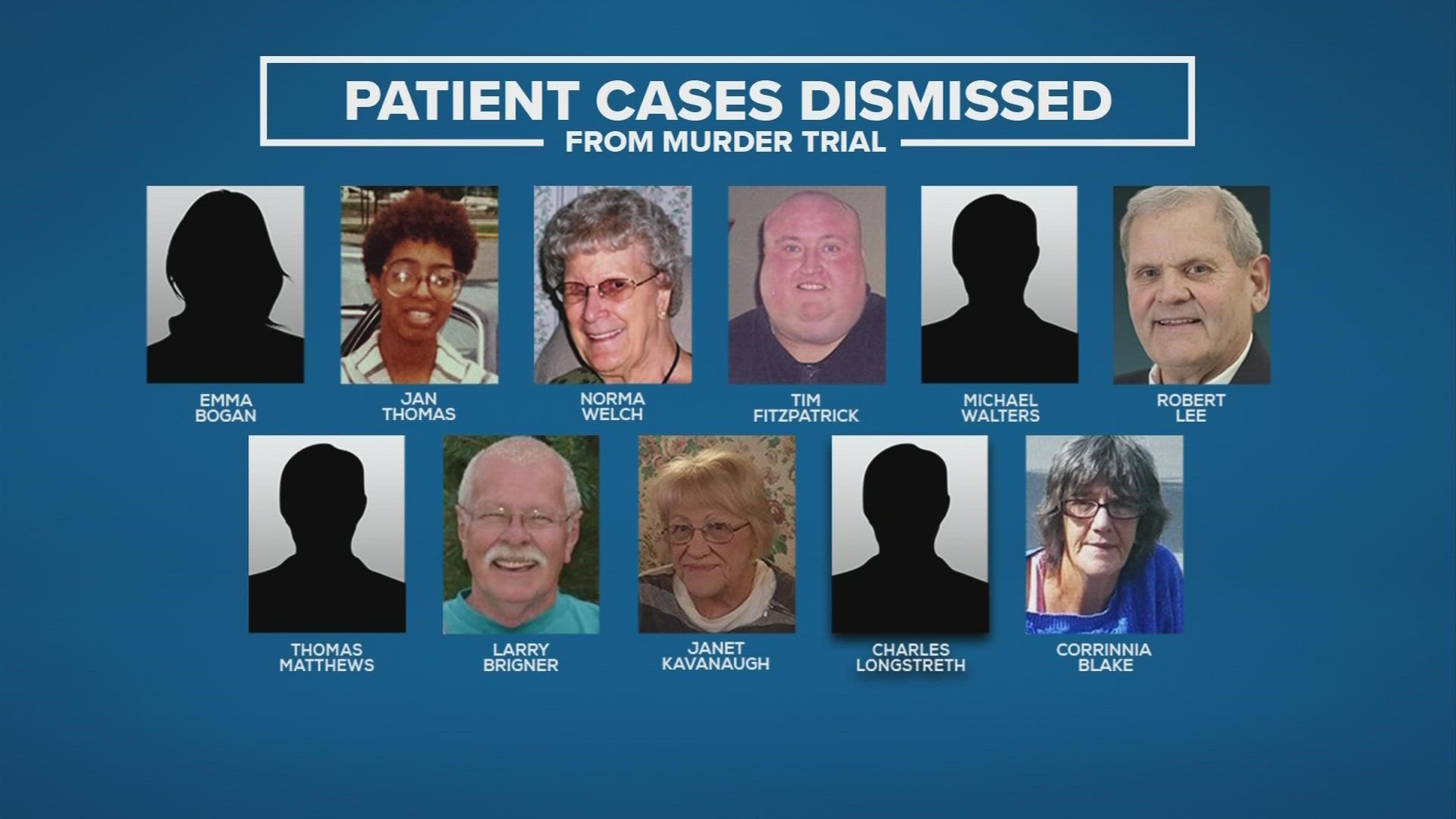COLUMBUS, Ohio — A judge made it official Friday, dismissing 11 of the 25 murder counts against Dr. William Husel three weeks before the start of his murder trial.
The former Mount Carmel critical care doctor is accused of ordering potentially fatal doses of fentanyl to be given to patients under his care.
Prosecutors declined to say why they decided to drop nearly half of the murder counts.
But it didn’t sit well for relatives of Jan Thomas, one of 11 patients whose cases will no longer be a part of the criminal case against Husel.
“Every time this is covered. She dies again. Every time her name flashes in the story - it’s back in the news. There is movement in the case. She dies all over again. And now to hear that 11 of these cases were dismissed, she is dying all over again,” Sean Thomas, Jan Thomas’ son told 10 Investigates in an interview Friday.
Sean said he was disappointed that the case hasn’t drawn more national media attention. It’s rare that a doctor is accused of being criminally culpable of killing the patients under his care.
“And it is shocking that this is happening. I am completely shocked and disappointed in the whole judicial system,” Sean said, referring to the dismissal of the cases.
Jan Thomas’ daughter, Nicole Thomas, told 10 Investigates her mother was a loving, beautiful person who loved life. Nicole was with her mother in March 2015 when she was admitted to the ICU at Mount Carmel West where she would later die.
It would be more than three years before Mount Carmel hospital would call families in December 2018 and tell them that their loved ones may have received too much medication.
“It doesn’t make sense. It’s not enough? It was enough to kill her but it’s not enough to prosecute him,” Nicole said.
That will be a central argument in the case: did the amount of fentanyl, the combination of it with other drugs and the rate at which they were given kill these patients?
Husel’s attorneys have said repeatedly that’s not the case - that these people were dying and that Husel was helping them avoid a painful death.
His medical license was suspended in early 2019 just weeks after he was fired by the hospital.
Following a Dec.1, 2021 hearing, Husel’s attorney Jose Baez told reporters:
“Dr. Husel practiced medicine with compassion and care. That was hit intent. And under the law – Ohio law – is that even if that killed them, so long as his intention was medically-based, then it’s not murder. It’s to treat someone. Taking them off life-support is what ultimately killed them.”
In late 2018, the hospital suspended and later fired Husel after questions were raised about his patient care. Six months later – in June 2019 – Husel was indicted on 25 counts of murder. Prosecutors initially chose to focus their case around those who received 500 micrograms of fentanyl or more.
But three weeks before the start of the trial – prosecutors have now chosen to drop 11 of these cases. They have declined to say why, despite being pressed repeatedly by reporters Thursday during a hearing over the matter.
A closer look at the cases that were dismissed reveals that the majority of them that were dropped received smaller doses of fentanyl -- of 1,000 micrograms or less - compared to the 14 patient cases that remain – where 11 of those 14 got doses of 1,000 micrograms or more.
Those 11 patient cases that were dismissed included:
- Emma Bogan, who received 900 micrograms of fentanyl
- Jan Thomas, who received 800 micrograms of fentanyl
- Norma Welch, who received 900 micrograms of fentanyl
- Tim Fitzpatrick, who received 500 micrograms of fentanyl
- Michael Walters, who received 500 micrograms of fentanyl
- Robert Lee, who received 500 micrograms of fentanyl
- Larry Brigner, who received 500 micrograms of fentanyl
- Janet Kavanaugh, who received 1,000 micrograms of fentanyl
- Charles Longstreth, who received 500 micrograms of fentanyl
- Corrinnia Blake, who received 500 micrograms of fentanyl
Husel’s trial is slated to begin on Feb. 14.

